Report on Entrepreneurial Ventures, Small Business Impact, and Growth
VerifiedAdded on 2021/02/21
|10
|2218
|32
Report
AI Summary
This report provides a comprehensive overview of entrepreneurship and small business management. It begins by defining entrepreneurship and small businesses, then delves into the various types of entrepreneurial ventures, including social, private, public, and scalable enterprises, highlighting their characteristics and relationships to entrepreneurial typologies. The report then examines the common aspects and differences between these ventures, emphasizing risk, innovation, and customer orientation. A significant portion of the report is dedicated to understanding the impact of micro and small businesses on the UK economy, supported by relevant statistics and data on employment, competition, and innovation. Finally, the report concludes by addressing the impact of small business start-ups on the growth of the social economy, focusing on quality of life improvements, poverty reduction, and better resource utilization. The report uses a variety of sources to support its claims and provide a well-rounded understanding of the subject.

Entrepreneurship
and
Small Business
Management
and
Small Business
Management
Paraphrase This Document
Need a fresh take? Get an instant paraphrase of this document with our AI Paraphraser
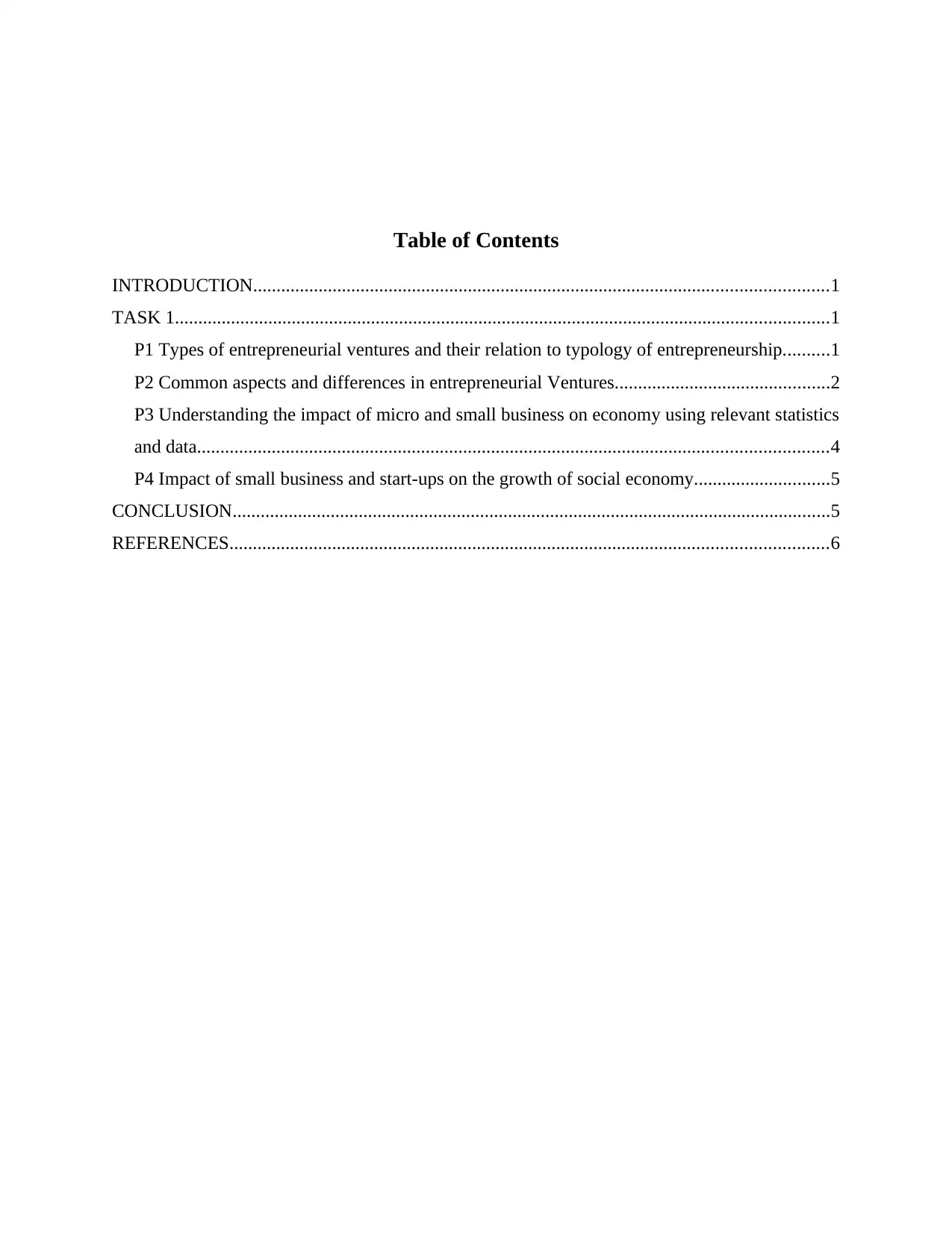
Table of Contents
INTRODUCTION...........................................................................................................................1
TASK 1............................................................................................................................................1
P1 Types of entrepreneurial ventures and their relation to typology of entrepreneurship..........1
P2 Common aspects and differences in entrepreneurial Ventures..............................................2
P3 Understanding the impact of micro and small business on economy using relevant statistics
and data.......................................................................................................................................4
P4 Impact of small business and start-ups on the growth of social economy.............................5
CONCLUSION................................................................................................................................5
REFERENCES................................................................................................................................6
INTRODUCTION...........................................................................................................................1
TASK 1............................................................................................................................................1
P1 Types of entrepreneurial ventures and their relation to typology of entrepreneurship..........1
P2 Common aspects and differences in entrepreneurial Ventures..............................................2
P3 Understanding the impact of micro and small business on economy using relevant statistics
and data.......................................................................................................................................4
P4 Impact of small business and start-ups on the growth of social economy.............................5
CONCLUSION................................................................................................................................5
REFERENCES................................................................................................................................6

⊘ This is a preview!⊘
Do you want full access?
Subscribe today to unlock all pages.

Trusted by 1+ million students worldwide
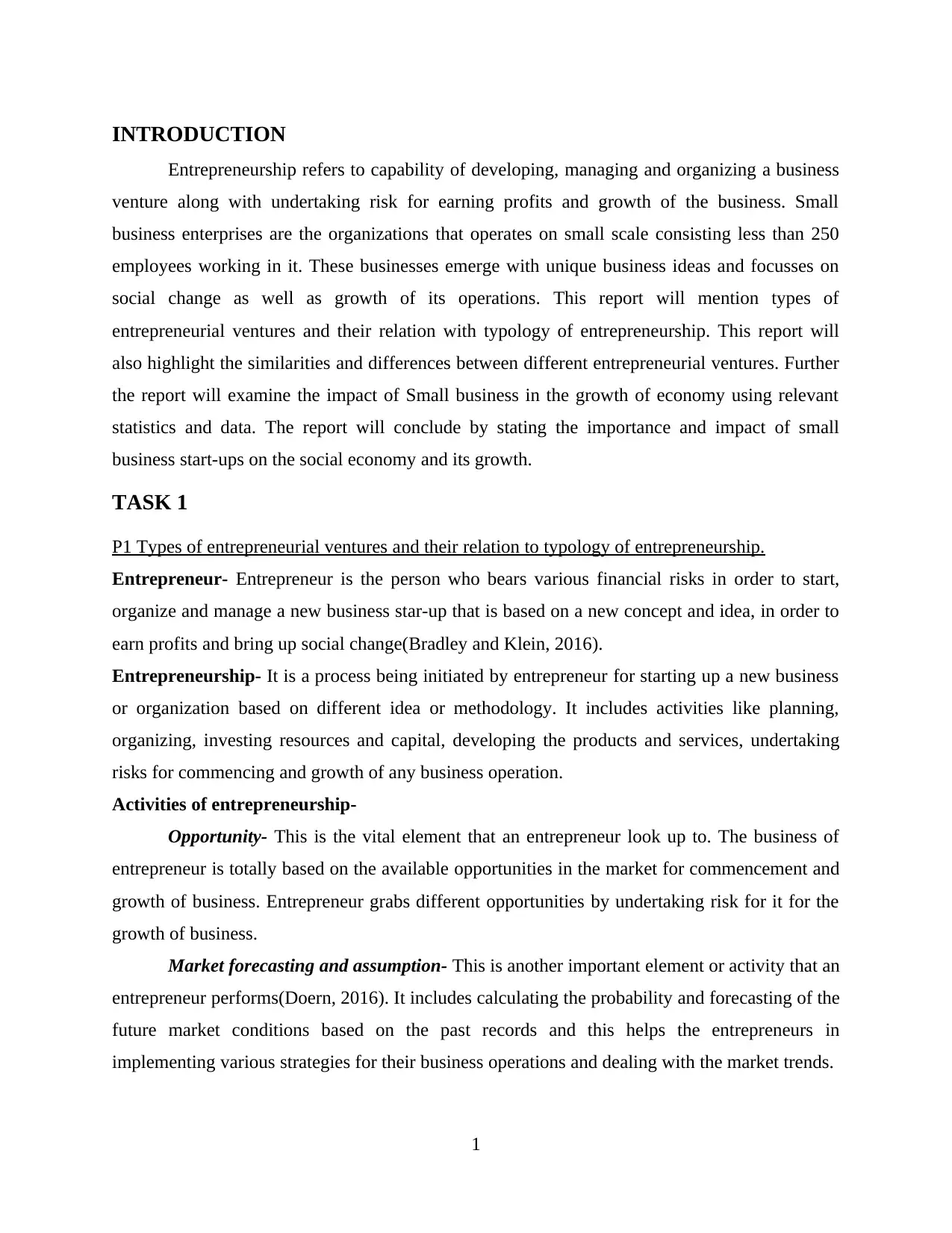
INTRODUCTION
Entrepreneurship refers to capability of developing, managing and organizing a business
venture along with undertaking risk for earning profits and growth of the business. Small
business enterprises are the organizations that operates on small scale consisting less than 250
employees working in it. These businesses emerge with unique business ideas and focusses on
social change as well as growth of its operations. This report will mention types of
entrepreneurial ventures and their relation with typology of entrepreneurship. This report will
also highlight the similarities and differences between different entrepreneurial ventures. Further
the report will examine the impact of Small business in the growth of economy using relevant
statistics and data. The report will conclude by stating the importance and impact of small
business start-ups on the social economy and its growth.
TASK 1
P1 Types of entrepreneurial ventures and their relation to typology of entrepreneurship.
Entrepreneur- Entrepreneur is the person who bears various financial risks in order to start,
organize and manage a new business star-up that is based on a new concept and idea, in order to
earn profits and bring up social change(Bradley and Klein, 2016).
Entrepreneurship- It is a process being initiated by entrepreneur for starting up a new business
or organization based on different idea or methodology. It includes activities like planning,
organizing, investing resources and capital, developing the products and services, undertaking
risks for commencing and growth of any business operation.
Activities of entrepreneurship-
Opportunity- This is the vital element that an entrepreneur look up to. The business of
entrepreneur is totally based on the available opportunities in the market for commencement and
growth of business. Entrepreneur grabs different opportunities by undertaking risk for it for the
growth of business.
Market forecasting and assumption- This is another important element or activity that an
entrepreneur performs(Doern, 2016). It includes calculating the probability and forecasting of the
future market conditions based on the past records and this helps the entrepreneurs in
implementing various strategies for their business operations and dealing with the market trends.
1
Entrepreneurship refers to capability of developing, managing and organizing a business
venture along with undertaking risk for earning profits and growth of the business. Small
business enterprises are the organizations that operates on small scale consisting less than 250
employees working in it. These businesses emerge with unique business ideas and focusses on
social change as well as growth of its operations. This report will mention types of
entrepreneurial ventures and their relation with typology of entrepreneurship. This report will
also highlight the similarities and differences between different entrepreneurial ventures. Further
the report will examine the impact of Small business in the growth of economy using relevant
statistics and data. The report will conclude by stating the importance and impact of small
business start-ups on the social economy and its growth.
TASK 1
P1 Types of entrepreneurial ventures and their relation to typology of entrepreneurship.
Entrepreneur- Entrepreneur is the person who bears various financial risks in order to start,
organize and manage a new business star-up that is based on a new concept and idea, in order to
earn profits and bring up social change(Bradley and Klein, 2016).
Entrepreneurship- It is a process being initiated by entrepreneur for starting up a new business
or organization based on different idea or methodology. It includes activities like planning,
organizing, investing resources and capital, developing the products and services, undertaking
risks for commencing and growth of any business operation.
Activities of entrepreneurship-
Opportunity- This is the vital element that an entrepreneur look up to. The business of
entrepreneur is totally based on the available opportunities in the market for commencement and
growth of business. Entrepreneur grabs different opportunities by undertaking risk for it for the
growth of business.
Market forecasting and assumption- This is another important element or activity that an
entrepreneur performs(Doern, 2016). It includes calculating the probability and forecasting of the
future market conditions based on the past records and this helps the entrepreneurs in
implementing various strategies for their business operations and dealing with the market trends.
1
Paraphrase This Document
Need a fresh take? Get an instant paraphrase of this document with our AI Paraphraser
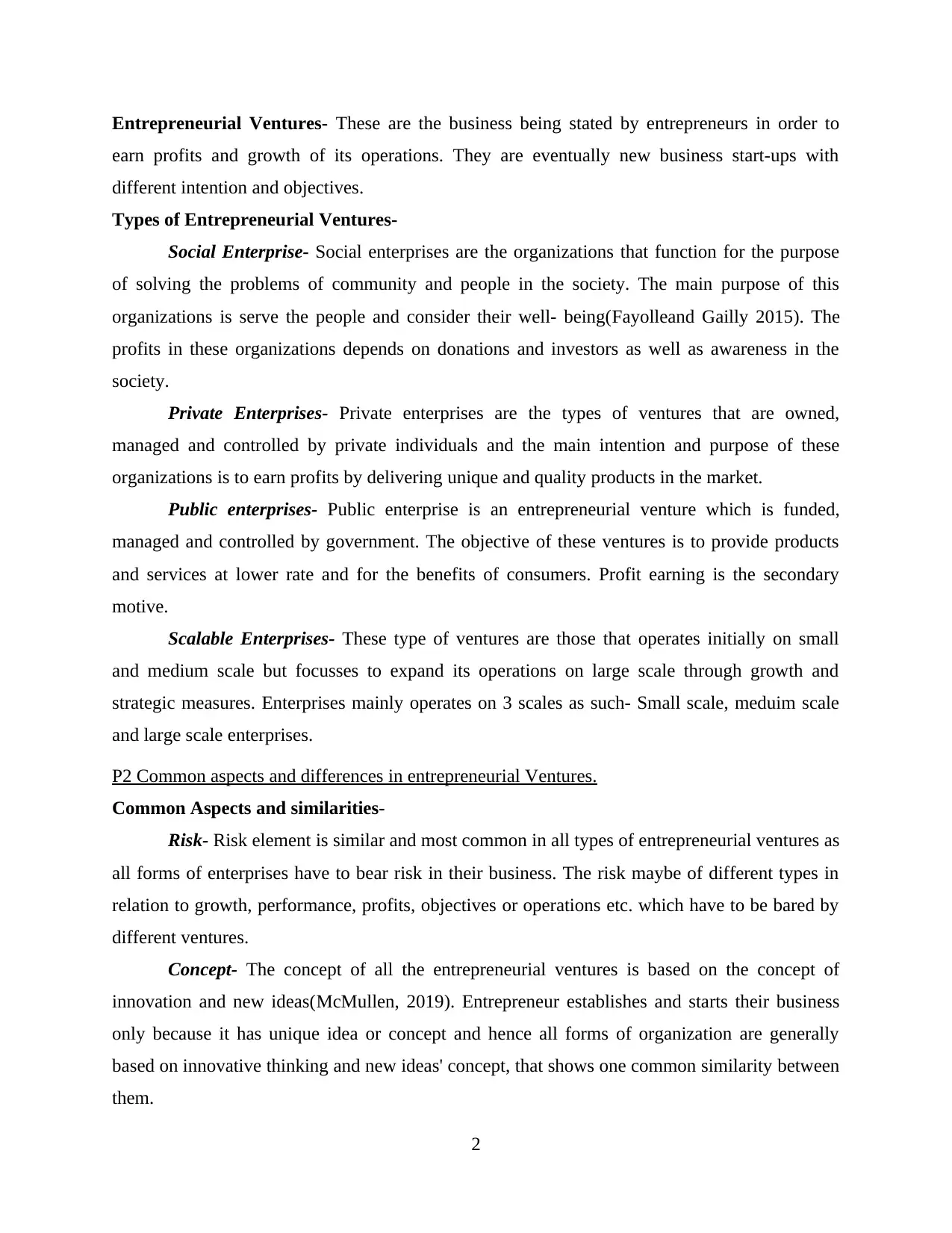
Entrepreneurial Ventures- These are the business being stated by entrepreneurs in order to
earn profits and growth of its operations. They are eventually new business start-ups with
different intention and objectives.
Types of Entrepreneurial Ventures-
Social Enterprise- Social enterprises are the organizations that function for the purpose
of solving the problems of community and people in the society. The main purpose of this
organizations is serve the people and consider their well- being(Fayolleand Gailly 2015). The
profits in these organizations depends on donations and investors as well as awareness in the
society.
Private Enterprises- Private enterprises are the types of ventures that are owned,
managed and controlled by private individuals and the main intention and purpose of these
organizations is to earn profits by delivering unique and quality products in the market.
Public enterprises- Public enterprise is an entrepreneurial venture which is funded,
managed and controlled by government. The objective of these ventures is to provide products
and services at lower rate and for the benefits of consumers. Profit earning is the secondary
motive.
Scalable Enterprises- These type of ventures are those that operates initially on small
and medium scale but focusses to expand its operations on large scale through growth and
strategic measures. Enterprises mainly operates on 3 scales as such- Small scale, meduim scale
and large scale enterprises.
P2 Common aspects and differences in entrepreneurial Ventures.
Common Aspects and similarities-
Risk- Risk element is similar and most common in all types of entrepreneurial ventures as
all forms of enterprises have to bear risk in their business. The risk maybe of different types in
relation to growth, performance, profits, objectives or operations etc. which have to be bared by
different ventures.
Concept- The concept of all the entrepreneurial ventures is based on the concept of
innovation and new ideas(McMullen, 2019). Entrepreneur establishes and starts their business
only because it has unique idea or concept and hence all forms of organization are generally
based on innovative thinking and new ideas' concept, that shows one common similarity between
them.
2
earn profits and growth of its operations. They are eventually new business start-ups with
different intention and objectives.
Types of Entrepreneurial Ventures-
Social Enterprise- Social enterprises are the organizations that function for the purpose
of solving the problems of community and people in the society. The main purpose of this
organizations is serve the people and consider their well- being(Fayolleand Gailly 2015). The
profits in these organizations depends on donations and investors as well as awareness in the
society.
Private Enterprises- Private enterprises are the types of ventures that are owned,
managed and controlled by private individuals and the main intention and purpose of these
organizations is to earn profits by delivering unique and quality products in the market.
Public enterprises- Public enterprise is an entrepreneurial venture which is funded,
managed and controlled by government. The objective of these ventures is to provide products
and services at lower rate and for the benefits of consumers. Profit earning is the secondary
motive.
Scalable Enterprises- These type of ventures are those that operates initially on small
and medium scale but focusses to expand its operations on large scale through growth and
strategic measures. Enterprises mainly operates on 3 scales as such- Small scale, meduim scale
and large scale enterprises.
P2 Common aspects and differences in entrepreneurial Ventures.
Common Aspects and similarities-
Risk- Risk element is similar and most common in all types of entrepreneurial ventures as
all forms of enterprises have to bear risk in their business. The risk maybe of different types in
relation to growth, performance, profits, objectives or operations etc. which have to be bared by
different ventures.
Concept- The concept of all the entrepreneurial ventures is based on the concept of
innovation and new ideas(McMullen, 2019). Entrepreneur establishes and starts their business
only because it has unique idea or concept and hence all forms of organization are generally
based on innovative thinking and new ideas' concept, that shows one common similarity between
them.
2
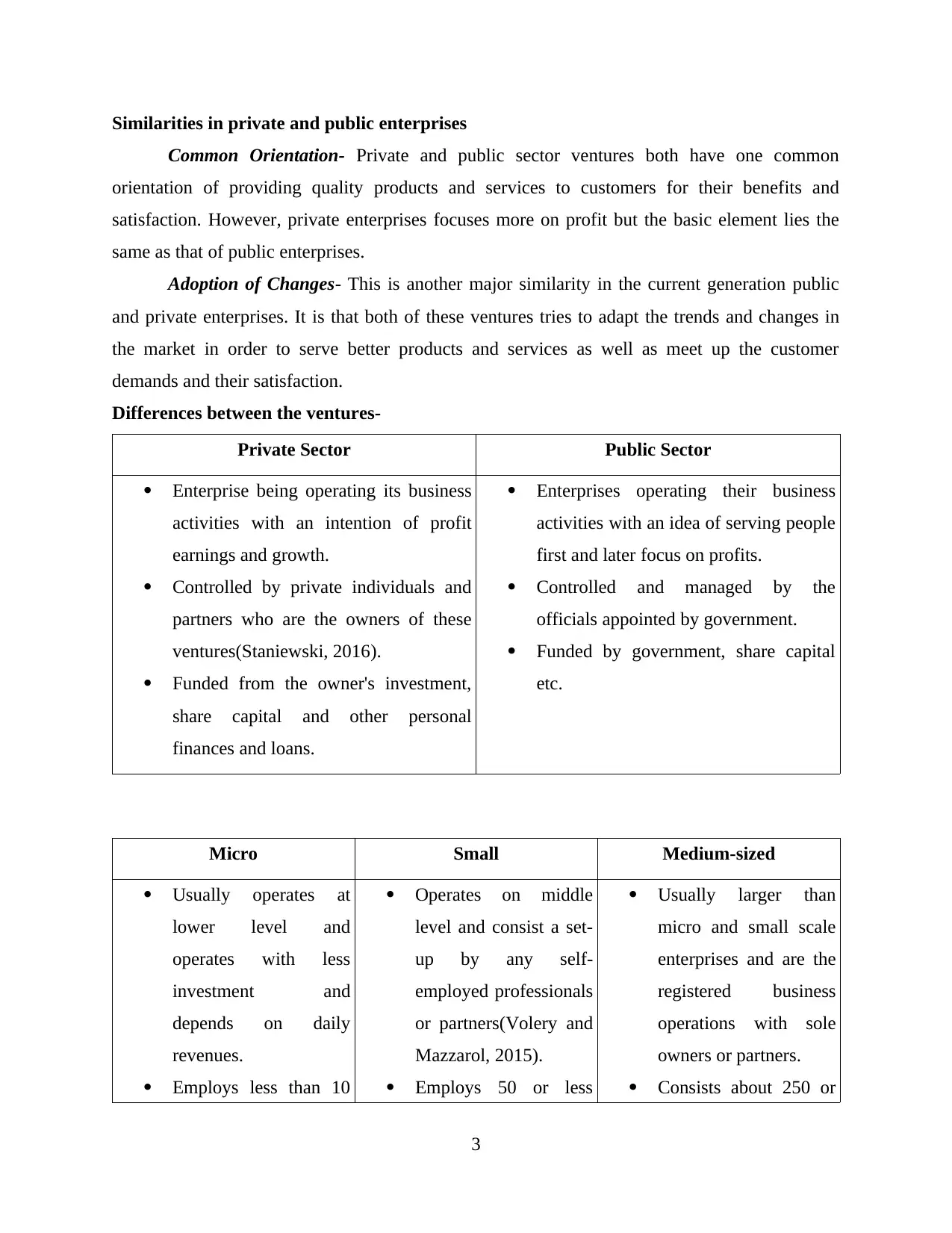
Similarities in private and public enterprises
Common Orientation- Private and public sector ventures both have one common
orientation of providing quality products and services to customers for their benefits and
satisfaction. However, private enterprises focuses more on profit but the basic element lies the
same as that of public enterprises.
Adoption of Changes- This is another major similarity in the current generation public
and private enterprises. It is that both of these ventures tries to adapt the trends and changes in
the market in order to serve better products and services as well as meet up the customer
demands and their satisfaction.
Differences between the ventures-
Private Sector Public Sector
Enterprise being operating its business
activities with an intention of profit
earnings and growth.
Controlled by private individuals and
partners who are the owners of these
ventures(Staniewski, 2016).
Funded from the owner's investment,
share capital and other personal
finances and loans.
Enterprises operating their business
activities with an idea of serving people
first and later focus on profits.
Controlled and managed by the
officials appointed by government.
Funded by government, share capital
etc.
Micro Small Medium-sized
Usually operates at
lower level and
operates with less
investment and
depends on daily
revenues.
Employs less than 10
Operates on middle
level and consist a set-
up by any self-
employed professionals
or partners(Volery and
Mazzarol, 2015).
Employs 50 or less
Usually larger than
micro and small scale
enterprises and are the
registered business
operations with sole
owners or partners.
Consists about 250 or
3
Common Orientation- Private and public sector ventures both have one common
orientation of providing quality products and services to customers for their benefits and
satisfaction. However, private enterprises focuses more on profit but the basic element lies the
same as that of public enterprises.
Adoption of Changes- This is another major similarity in the current generation public
and private enterprises. It is that both of these ventures tries to adapt the trends and changes in
the market in order to serve better products and services as well as meet up the customer
demands and their satisfaction.
Differences between the ventures-
Private Sector Public Sector
Enterprise being operating its business
activities with an intention of profit
earnings and growth.
Controlled by private individuals and
partners who are the owners of these
ventures(Staniewski, 2016).
Funded from the owner's investment,
share capital and other personal
finances and loans.
Enterprises operating their business
activities with an idea of serving people
first and later focus on profits.
Controlled and managed by the
officials appointed by government.
Funded by government, share capital
etc.
Micro Small Medium-sized
Usually operates at
lower level and
operates with less
investment and
depends on daily
revenues.
Employs less than 10
Operates on middle
level and consist a set-
up by any self-
employed professionals
or partners(Volery and
Mazzarol, 2015).
Employs 50 or less
Usually larger than
micro and small scale
enterprises and are the
registered business
operations with sole
owners or partners.
Consists about 250 or
3
⊘ This is a preview!⊘
Do you want full access?
Subscribe today to unlock all pages.

Trusted by 1+ million students worldwide
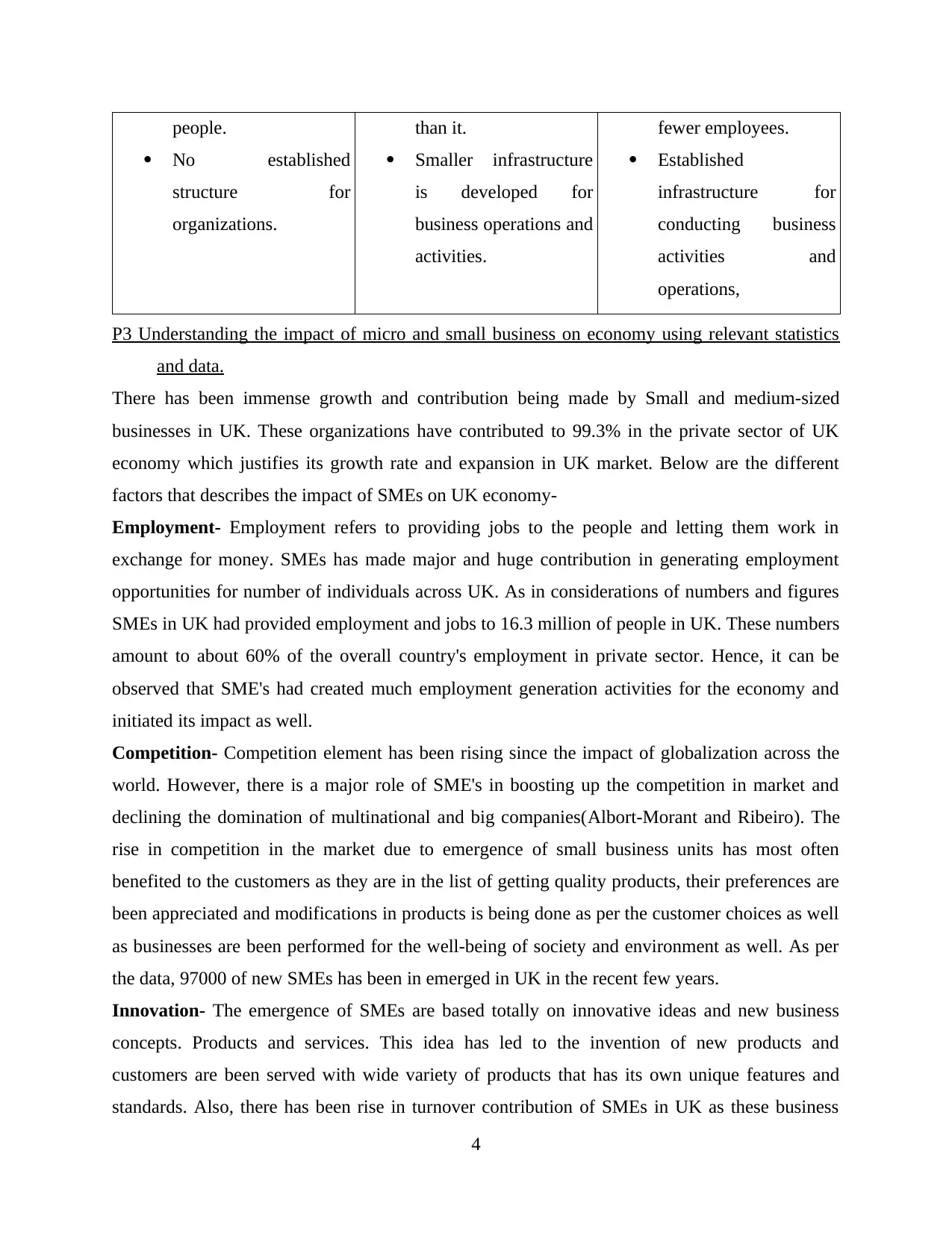
people.
No established
structure for
organizations.
than it.
Smaller infrastructure
is developed for
business operations and
activities.
fewer employees.
Established
infrastructure for
conducting business
activities and
operations,
P3 Understanding the impact of micro and small business on economy using relevant statistics
and data.
There has been immense growth and contribution being made by Small and medium-sized
businesses in UK. These organizations have contributed to 99.3% in the private sector of UK
economy which justifies its growth rate and expansion in UK market. Below are the different
factors that describes the impact of SMEs on UK economy-
Employment- Employment refers to providing jobs to the people and letting them work in
exchange for money. SMEs has made major and huge contribution in generating employment
opportunities for number of individuals across UK. As in considerations of numbers and figures
SMEs in UK had provided employment and jobs to 16.3 million of people in UK. These numbers
amount to about 60% of the overall country's employment in private sector. Hence, it can be
observed that SME's had created much employment generation activities for the economy and
initiated its impact as well.
Competition- Competition element has been rising since the impact of globalization across the
world. However, there is a major role of SME's in boosting up the competition in market and
declining the domination of multinational and big companies(Albort-Morant and Ribeiro). The
rise in competition in the market due to emergence of small business units has most often
benefited to the customers as they are in the list of getting quality products, their preferences are
been appreciated and modifications in products is being done as per the customer choices as well
as businesses are been performed for the well-being of society and environment as well. As per
the data, 97000 of new SMEs has been in emerged in UK in the recent few years.
Innovation- The emergence of SMEs are based totally on innovative ideas and new business
concepts. Products and services. This idea has led to the invention of new products and
customers are been served with wide variety of products that has its own unique features and
standards. Also, there has been rise in turnover contribution of SMEs in UK as these business
4
No established
structure for
organizations.
than it.
Smaller infrastructure
is developed for
business operations and
activities.
fewer employees.
Established
infrastructure for
conducting business
activities and
operations,
P3 Understanding the impact of micro and small business on economy using relevant statistics
and data.
There has been immense growth and contribution being made by Small and medium-sized
businesses in UK. These organizations have contributed to 99.3% in the private sector of UK
economy which justifies its growth rate and expansion in UK market. Below are the different
factors that describes the impact of SMEs on UK economy-
Employment- Employment refers to providing jobs to the people and letting them work in
exchange for money. SMEs has made major and huge contribution in generating employment
opportunities for number of individuals across UK. As in considerations of numbers and figures
SMEs in UK had provided employment and jobs to 16.3 million of people in UK. These numbers
amount to about 60% of the overall country's employment in private sector. Hence, it can be
observed that SME's had created much employment generation activities for the economy and
initiated its impact as well.
Competition- Competition element has been rising since the impact of globalization across the
world. However, there is a major role of SME's in boosting up the competition in market and
declining the domination of multinational and big companies(Albort-Morant and Ribeiro). The
rise in competition in the market due to emergence of small business units has most often
benefited to the customers as they are in the list of getting quality products, their preferences are
been appreciated and modifications in products is being done as per the customer choices as well
as businesses are been performed for the well-being of society and environment as well. As per
the data, 97000 of new SMEs has been in emerged in UK in the recent few years.
Innovation- The emergence of SMEs are based totally on innovative ideas and new business
concepts. Products and services. This idea has led to the invention of new products and
customers are been served with wide variety of products that has its own unique features and
standards. Also, there has been rise in turnover contribution of SMEs in UK as these business
4
Paraphrase This Document
Need a fresh take? Get an instant paraphrase of this document with our AI Paraphraser
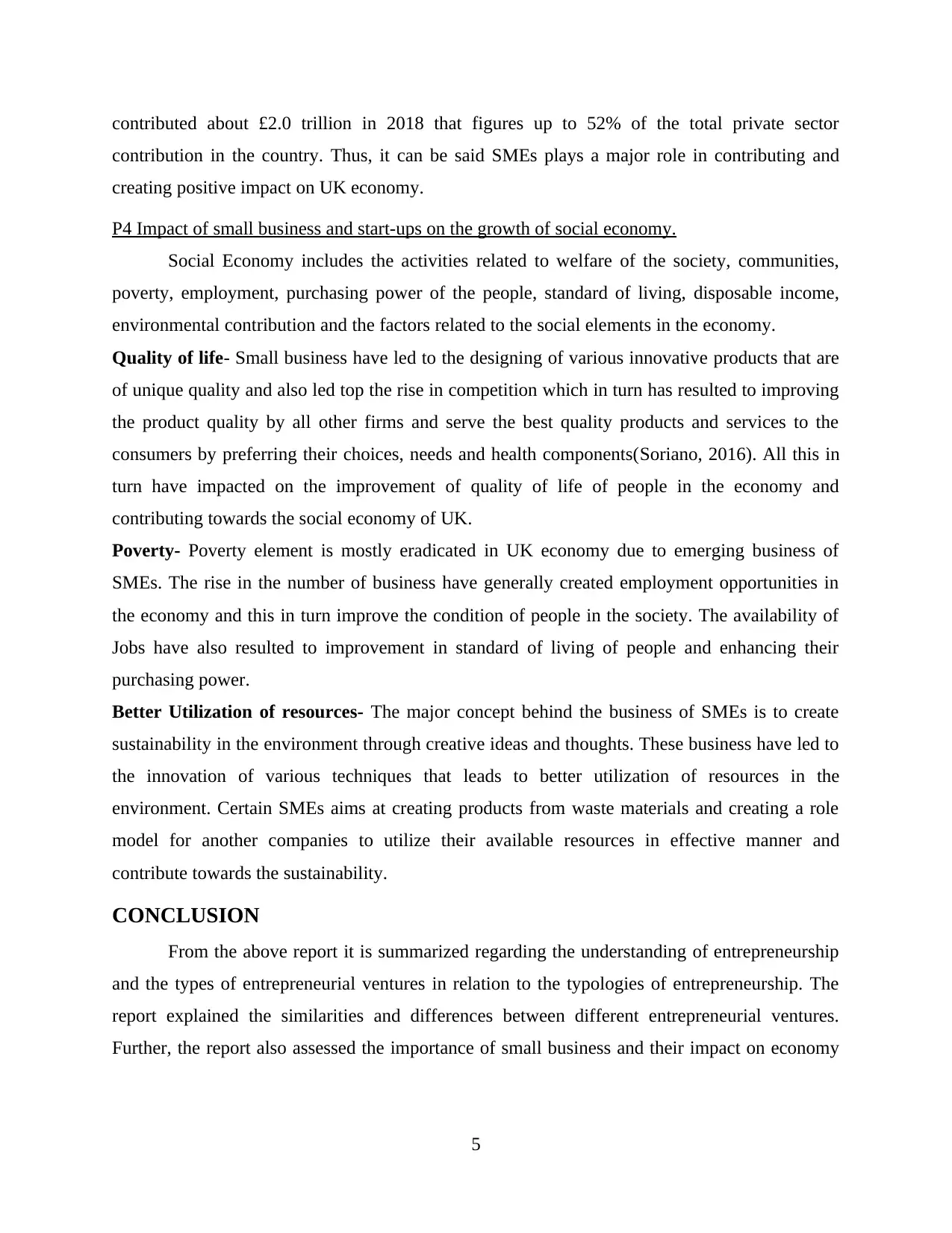
contributed about £2.0 trillion in 2018 that figures up to 52% of the total private sector
contribution in the country. Thus, it can be said SMEs plays a major role in contributing and
creating positive impact on UK economy.
P4 Impact of small business and start-ups on the growth of social economy.
Social Economy includes the activities related to welfare of the society, communities,
poverty, employment, purchasing power of the people, standard of living, disposable income,
environmental contribution and the factors related to the social elements in the economy.
Quality of life- Small business have led to the designing of various innovative products that are
of unique quality and also led top the rise in competition which in turn has resulted to improving
the product quality by all other firms and serve the best quality products and services to the
consumers by preferring their choices, needs and health components(Soriano, 2016). All this in
turn have impacted on the improvement of quality of life of people in the economy and
contributing towards the social economy of UK.
Poverty- Poverty element is mostly eradicated in UK economy due to emerging business of
SMEs. The rise in the number of business have generally created employment opportunities in
the economy and this in turn improve the condition of people in the society. The availability of
Jobs have also resulted to improvement in standard of living of people and enhancing their
purchasing power.
Better Utilization of resources- The major concept behind the business of SMEs is to create
sustainability in the environment through creative ideas and thoughts. These business have led to
the innovation of various techniques that leads to better utilization of resources in the
environment. Certain SMEs aims at creating products from waste materials and creating a role
model for another companies to utilize their available resources in effective manner and
contribute towards the sustainability.
CONCLUSION
From the above report it is summarized regarding the understanding of entrepreneurship
and the types of entrepreneurial ventures in relation to the typologies of entrepreneurship. The
report explained the similarities and differences between different entrepreneurial ventures.
Further, the report also assessed the importance of small business and their impact on economy
5
contribution in the country. Thus, it can be said SMEs plays a major role in contributing and
creating positive impact on UK economy.
P4 Impact of small business and start-ups on the growth of social economy.
Social Economy includes the activities related to welfare of the society, communities,
poverty, employment, purchasing power of the people, standard of living, disposable income,
environmental contribution and the factors related to the social elements in the economy.
Quality of life- Small business have led to the designing of various innovative products that are
of unique quality and also led top the rise in competition which in turn has resulted to improving
the product quality by all other firms and serve the best quality products and services to the
consumers by preferring their choices, needs and health components(Soriano, 2016). All this in
turn have impacted on the improvement of quality of life of people in the economy and
contributing towards the social economy of UK.
Poverty- Poverty element is mostly eradicated in UK economy due to emerging business of
SMEs. The rise in the number of business have generally created employment opportunities in
the economy and this in turn improve the condition of people in the society. The availability of
Jobs have also resulted to improvement in standard of living of people and enhancing their
purchasing power.
Better Utilization of resources- The major concept behind the business of SMEs is to create
sustainability in the environment through creative ideas and thoughts. These business have led to
the innovation of various techniques that leads to better utilization of resources in the
environment. Certain SMEs aims at creating products from waste materials and creating a role
model for another companies to utilize their available resources in effective manner and
contribute towards the sustainability.
CONCLUSION
From the above report it is summarized regarding the understanding of entrepreneurship
and the types of entrepreneurial ventures in relation to the typologies of entrepreneurship. The
report explained the similarities and differences between different entrepreneurial ventures.
Further, the report also assessed the importance of small business and their impact on economy
5
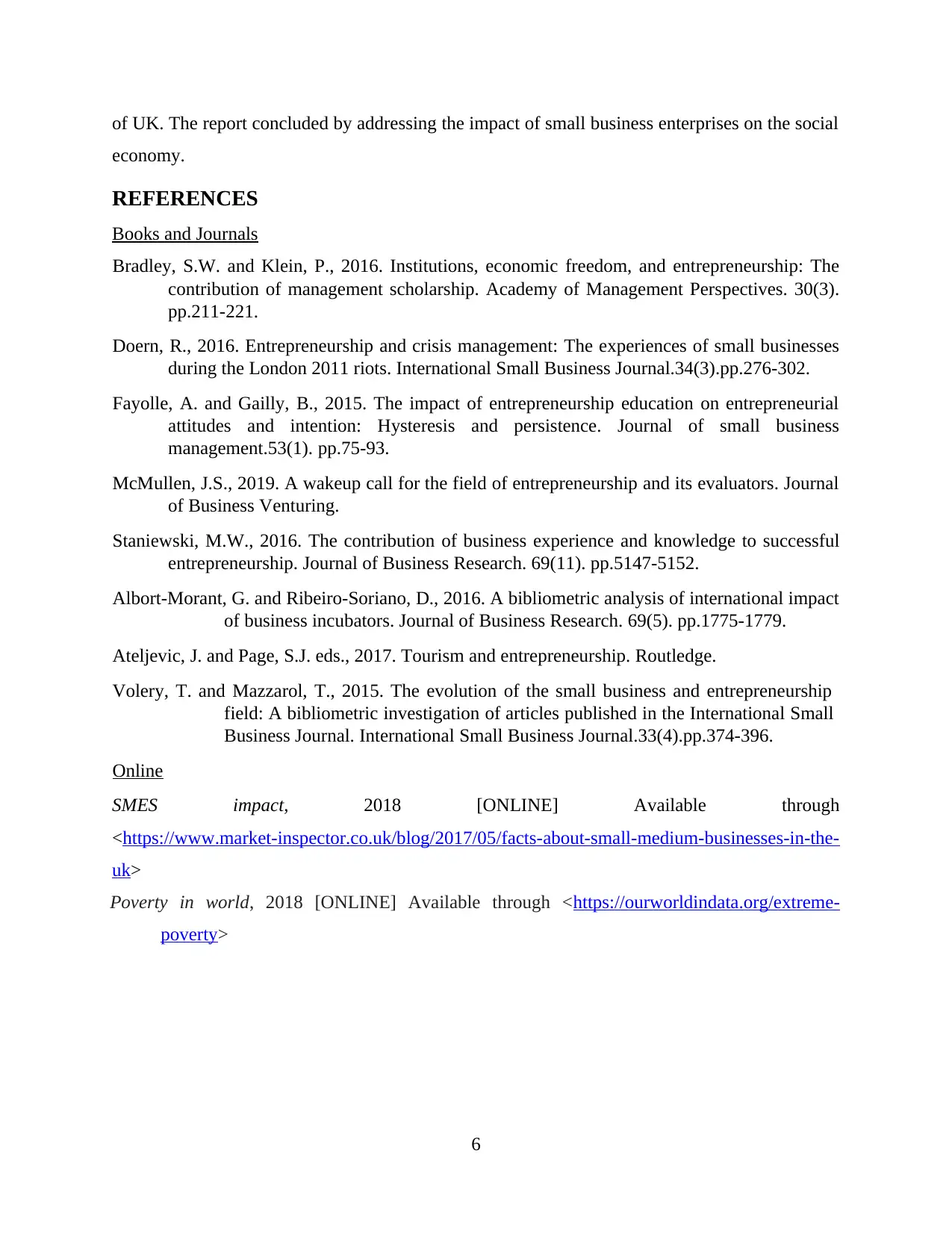
of UK. The report concluded by addressing the impact of small business enterprises on the social
economy.
REFERENCES
Books and Journals
Bradley, S.W. and Klein, P., 2016. Institutions, economic freedom, and entrepreneurship: The
contribution of management scholarship. Academy of Management Perspectives. 30(3).
pp.211-221.
Doern, R., 2016. Entrepreneurship and crisis management: The experiences of small businesses
during the London 2011 riots. International Small Business Journal.34(3).pp.276-302.
Fayolle, A. and Gailly, B., 2015. The impact of entrepreneurship education on entrepreneurial
attitudes and intention: Hysteresis and persistence. Journal of small business
management.53(1). pp.75-93.
McMullen, J.S., 2019. A wakeup call for the field of entrepreneurship and its evaluators. Journal
of Business Venturing.
Staniewski, M.W., 2016. The contribution of business experience and knowledge to successful
entrepreneurship. Journal of Business Research. 69(11). pp.5147-5152.
Albort-Morant, G. and Ribeiro-Soriano, D., 2016. A bibliometric analysis of international impact
of business incubators. Journal of Business Research. 69(5). pp.1775-1779.
Ateljevic, J. and Page, S.J. eds., 2017. Tourism and entrepreneurship. Routledge.
Volery, T. and Mazzarol, T., 2015. The evolution of the small business and entrepreneurship
field: A bibliometric investigation of articles published in the International Small
Business Journal. International Small Business Journal.33(4).pp.374-396.
Online
SMES impact, 2018 [ONLINE] Available through
<https://www.market-inspector.co.uk/blog/2017/05/facts-about-small-medium-businesses-in-the-
uk>
Poverty in world, 2018 [ONLINE] Available through <https://ourworldindata.org/extreme-
poverty>
6
economy.
REFERENCES
Books and Journals
Bradley, S.W. and Klein, P., 2016. Institutions, economic freedom, and entrepreneurship: The
contribution of management scholarship. Academy of Management Perspectives. 30(3).
pp.211-221.
Doern, R., 2016. Entrepreneurship and crisis management: The experiences of small businesses
during the London 2011 riots. International Small Business Journal.34(3).pp.276-302.
Fayolle, A. and Gailly, B., 2015. The impact of entrepreneurship education on entrepreneurial
attitudes and intention: Hysteresis and persistence. Journal of small business
management.53(1). pp.75-93.
McMullen, J.S., 2019. A wakeup call for the field of entrepreneurship and its evaluators. Journal
of Business Venturing.
Staniewski, M.W., 2016. The contribution of business experience and knowledge to successful
entrepreneurship. Journal of Business Research. 69(11). pp.5147-5152.
Albort-Morant, G. and Ribeiro-Soriano, D., 2016. A bibliometric analysis of international impact
of business incubators. Journal of Business Research. 69(5). pp.1775-1779.
Ateljevic, J. and Page, S.J. eds., 2017. Tourism and entrepreneurship. Routledge.
Volery, T. and Mazzarol, T., 2015. The evolution of the small business and entrepreneurship
field: A bibliometric investigation of articles published in the International Small
Business Journal. International Small Business Journal.33(4).pp.374-396.
Online
SMES impact, 2018 [ONLINE] Available through
<https://www.market-inspector.co.uk/blog/2017/05/facts-about-small-medium-businesses-in-the-
uk>
Poverty in world, 2018 [ONLINE] Available through <https://ourworldindata.org/extreme-
poverty>
6
⊘ This is a preview!⊘
Do you want full access?
Subscribe today to unlock all pages.

Trusted by 1+ million students worldwide

7
1 out of 10
Related Documents
Your All-in-One AI-Powered Toolkit for Academic Success.
+13062052269
info@desklib.com
Available 24*7 on WhatsApp / Email
![[object Object]](/_next/static/media/star-bottom.7253800d.svg)
Unlock your academic potential
Copyright © 2020–2025 A2Z Services. All Rights Reserved. Developed and managed by ZUCOL.





